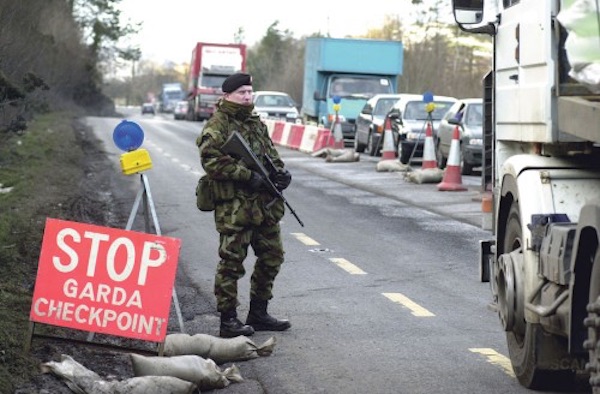
The British government appears to be planning a return of customs controls across the Six County border and may even be hoping to push all of Ireland out of the EU following hardline statements on its Brexit plans this week.
In an outline of its plans published in a White Paper, the Tories showed their intention that the north of Ireland will be taken out of the EU single market and customs union. Experts have said this will inevitably require the introduction of checkpoints at the border.
British governor in the North, James Brokenshire said that his government will look at addressing “individual issues” for the North of Ireland during Brexit negotiations, but described calls for the Six Counties to have special status to allow them to remain inside the EU customs union as the “wrong approach”.
The British stance has generated frustration amid a growing sense of crisis.
“This position does little in our view to deal with the disastrous political, social and economic impact Brexit will have on our interests here on the island of Ireland,” said Sinn Fein’s Michell O’Neill.
British prime minister Theresa May’s visited Dublin for an effective photocall with Irish Taoiseach Enda Kenny last Monday, but only after refusing an invitation to address the Dublin parliament . Her description of future border arrangements as “frictionless” reinforced concerns that her government has already begun to gently promote the return of border controls.
Two EU customs and international trade experts, Michael Lux and Eric Pickett this week told a Westminster committee that the British PM was using “nice words” -- but that the Dublin government would be forced to implement full EU customs checks, with all the necessary security implications.
Some MPs expressed shock when Mr Lux gave another example of problems that would arise post-Brexit. “If a Northern Ireland person has a walk and takes its dog over the border there are specific rules on what kind of document you have to have,” he told the committee. “You need a specific document - if you bring a horse riding you also need a specific document.”
Commentators believe Britain might now be intending to put the 26 County state in the position of having to choose between reinforcing the implementation of partition, which could prove politically devastating, or leaving the EU.
Ms O’Neill said she met Theresa May on Monday but that she “did not listen” to her concerns. She warned aspirations for a friction-free Brexit “do not mean anything in practice” and again called for the north of Ireland to be accorded special status within the EU.
“What we are very sure of is the implications of a hard Brexit are going to mean a hard border - a soft border is a nonsense,” she said. “So the implications are severe.”
Sinn Fein has pointed to the example of Greenland, which secured a special deal after it left the European Community in 1985 covering fisheries. Mrs O’Neill told an event in Belfast: “We are not looking to recreate the wheel. This is something that has been done elsewhere. Other states have had opportunity to have special designated status. We are asking for the same.”
There were also deep implications for the peace process after the Supreme Court in London controversially recognised the sovereignty of the Westminster parliament above the result of the Brexit referendum -- both for the British jurisdiction as a whole and for the individual devolved regions, including the Six Counties.
The judgement overrules that section of the Good Friday Agreement which states that the consent of those within the Six County area is required for a change in its constitutional status.
Ms O’Neill called for he political, constitutional and institutional integrity of the Good Friday Agreement to be “fully defended”.
“It is clear that Tory Government is seeking to impose Brexit against the will of the people in the north and of the people of Scotland. The Tory Government have effectively set aside the democratic process to pursue their own narrow political agenda,” she said.
Des Dalton of Republican Sinn Fein said the ruling had emphasised that powers of national sovereignty are “vested in the British imperial parliament at Westminster” while the Six County state is regarded as merely another region under its rule.
“The British Supreme Court Ruling exposes the reality that the British government’s supposed concern for the ‘will of the majority within Northern Ireland’ is subservient to the interests of the imperial parliament at Westminster,” he said.
![[Irish Republican News]](https://republican-news.org/graphics/title_gifs/rn.gif)
![[Irish Republican News]](https://republican-news.org/graphics/title_gifs/harp.gif)

